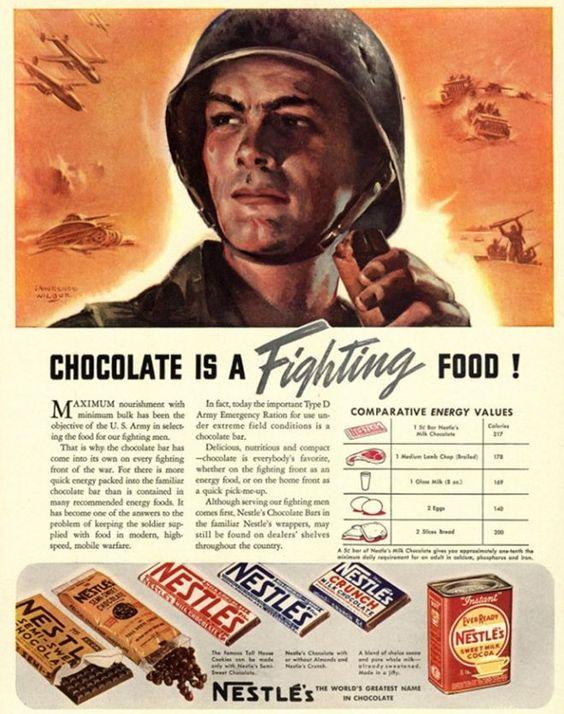
Wanted all about «Airmanchocolate» and other pick-me-ups used in the USAAF during WWII to keep pilots wide awake for up to 30 hours, an advantage during the long flights to the theater of operations. «Airmanchocolate» was fortified with Pervitin, a drug that was called a "pick-me-up," today known as "Speed" or "Cristal," as a so-called "party drug." You know something about it? Please get in touch, thank you.
Stories of drug use by Hitler and German forces during World War II have been widely told. Also less well known are the pharmacological "force enhancers" taken by Allied commanders. By 1941, rumors were confirmed of Nazi soldiers using a "super drug" identified as methamphetamine pervitin, and Allied commanders launched their own secret program to find the perfect war drug. During the war, one in three Allied soldiers became incapacitated without being physically injured. Modern weapons and warfare proved so terrifying that nearly as many men were shredded by battle fatigue and shell shock - now known as post-traumatic stress disorder (PTSD) - as by bullets and shrapnel. Allied commanders believed benzedrine, an amphetamine similar to pervitin, was the answer and hoped the amphetamine would conquer not only the need for sleep but also fear and anxiety among troops. How this drug affected the course of World War II is an ongoing controversy. The methamphetamine pervitin, developed in the 1930s by a German pharmacologist and manufactured by Temmler Pharmaceutical, was marketed to the general public in a campaign modeled after Coca-Cola's global strategy. The stimulant was then given to Luftwaffe pilots to keep them awake and alive when their plane was shot down. By May 1940, German troops under the influence of Pervitin had conquered Poland and were preparing to attack France. Before the battle, 35 million Pervitin pills were supplied to 3 million Wehrmacht soldiers within 10-12 weeks. The Wehrmacht soldiers then managed to fight and march for 10 days, covering an average of 22 miles per day. The Wehrmacht was able to lure the entire British Army to the beaches of Dunkirk in one of the greatest feats in military history. For Allied soldiers, caffeine was the primary stimulant of choice. Coffee was so closely associated with American soldiers, also known as GI Joes, that the term "Cup of Joe" became synonymous with the beverage. In 1940, the British Army discovered Pervitin in a downed German plane in the south of England, which unlocked the secret of the boundless energy of German troops and prompted the Allies to consider the same tactic for their troops. The Allied troops decided to use amphetamine Both drugs make users intensely alert by flooding them with a sense of euphoria. With its added methyl group molecule, Pervitin races across the blood-brain barrier slightly faster than Benzedrine. Otherwise, the two drugs have virtually the same effect. After the British victory at El Alamein, American soldiers entered ground combat in North Africa in November 1942. The troops carried packs of Benzedrine after U.S. General Dwight Eisenhower ordered about half a million tablets for them. German Navy mini-submarines used to torpedo Allied ships moving supplies and troops across the English Channel required soldiers to sit in cramped quarters for 48 hours without sleep or much exercise. Looking for a solution to keep these submariners awake and alert, the German Navy tested combinations of cocaine and methamphetamines by forcing prisoners at the Sachsenhausen concentration camp to take the stimulant and carry stone bags on their infamous shoe test track. Benzedrine and Pervitin continued to be used after World War II. In the 1950s, amphetamines were marketed as diet pills and mood enhancers, with celebrities such as Marilyn Monroe and Jack Kerouac using the stimulants. Buzzworthy moments. To test whether Wehrmacht soldiers needed Pervitin to achieve their stunning 1940 victory in France, James Holland and a group of history buffs recreate the soldiers' plight by attempting to cover 22 miles in a single day while carrying 60 pounds of combat weight using only coffee and tea as stimulants. In 1942, commanding officer Bernard Montgomery is taken to North Africa to boost the morale of British troops fighting in the region. In the Film, Holland discovers a document from Montgomery's medical officer Q.V. Wallace that reveals troops involved in the early stages of the Battle of El Alamein were given Benzedrine, providing evidence that orders for the drug came directly from the Top of the British command. The memo also makes clear that the British 24heit The soldiers of the armored brigade were prescribed 20 milligrams of Benzedrine per day before the second battle of El Alamein in Egypt - twice the amount recommended to RAF pilots. Seventy years after sinking in battle, a German Heinkel HE-1-1-5 bomber is pulled from a Norwegian fjord. The only aircraft of its kind ever recovered, it is remarkably intact and a rescue package is inside. A Pervitin package is discovered but disintegrates when an attempt was made to clean it.
Source : Jacqueline Medin, Secrets of the Dead